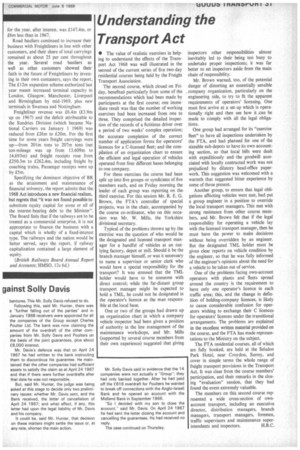Understanding the Transport Act
Page 33

If you've noticed an error in this article please click here to report it so we can fix it.
• The value of realistic exercises in helping to understand the effects of the Transport Act 1968 was well illustrated in the second of the current series of five two-day residential courses being held by the Freight Transport Association.
The second course, which closed on Friday, benefited particularly from some of the recommendations which had been made by participants at the first course; one immediate result was that the number of working exercises had been increased from one to three. They comprised the detailed inspection of the records of a fictitious driver over a period of two weeks' complex operation; the accurate completion of the correct number of application forms for operators' licences for a C-licensed fleet: and the compilation of an organization chart to ensure the efficient and legal operation of vehicles operated from four different bases belonging to one company.
For these exercises the course had been split up into five groups or syndicates of five members each, and on Friday morning the leader of each group was reporting on the. thirdexercise. For this session Mr. R. E. G. Brown, the FTA's controller of special projects, was in the chair, accompanied by the course co-ordinator, who on this occasion was Mr. W. Mills, the Yorkshire divisional secretary.
Typical of the problems thrown up by the exercise was the question of who would be the designated and licensed transport manager for a handful of vehicles at an outlying factory, depot or mill. Should it be the branch manager himself, or was it necessary to name a supervisor or senior clerk who would have a special responsibility for the transport? It was stressed that the TML holder would have to be someone with direct control; while the far-distant group transport manager might be expected to hold a TML, he could not be designated in the operator's licence as the man responsible at the local base.
One or two of the groups had drawn up an organization chart in which a company vehicle inspector had been given a position of authority in the line management of the maintenance workshops, and Mr. Mills (supported by several course members from their own experience) suggested that giving inspectors other responsibilities almost inevitably led to their being too busy to undertake proper inspections; it was far better to set inspectors aside from the main chain of responsibility.
Mr. Brown warned, too, of the potential danger of distorting an essentially sensible • company organization, particularly on the engineering side, to try to fit the apparent requirements of operators' licensing. One must first arrive at a set-up which is operationally right and then see how it ,can be made to comply with all the legal obligations.
One group had arranged for its "exercise fleet" to have all inspections undertaken by the PTA, and had planned for one of the sizeable sub-depots to have its own accounting section, so that local bills were dealt with expeditiously and the goodwill associated with locally contracted work was not prejudiced by dilatory head-office paperwork. This suggestion was welcomed with a warmth that suggested bitter experience by some of those present.
Another group, to ensure that legal obligations affecting vehicles were met, had put a group engineer in a position to override the local transport managers. This met with strong resistance from other course members, and Mr. Brown felt that if the legal responsibility for operating a vehicle lay with the licensed transport manager, then he must have the power to make decisions without being overridden by an engineer. But the designated TML holder must be given clear reports on vehicle condition by the engineer, so that he was fully informed of the engineer's opinions about the need for a vehicle to be taken out of service.
One of the problems facing own-account operators with plants and fleets spread around the country is the requirement to have only one operator's licence in each traffic area; this, and the change in definition of holding-company licences, is likely to cause considerable confusion for operators wishing to exchange their C licences for operators' licences under the transitional arrangements. The problems are explained in the excellent written material provided on the course, and the PTA has made representations to the Ministry on the subject.
The FTA residential courses, all of which are fully booked, are held at the Selsdon Park -Hotel, near Croydon, Surrey, and cover in simple terms the whole range of freight transport provisions in the Transport Act. It was clear from the course members' participation, and their remarks in the closing "evaluation" session, that they bad found the event extremely valuable.
The members on this second course represented a wide cross-section of ownaccount transport, including an executive director, distribution managers, branch managers, transport managers, foremen, traffic supervisors and maintenance super intendents and inspectors. H.B.C.


























































































































